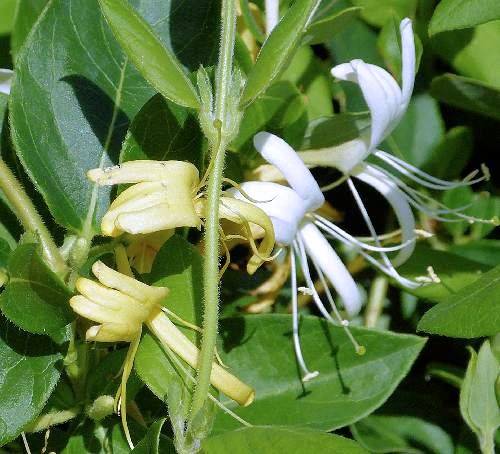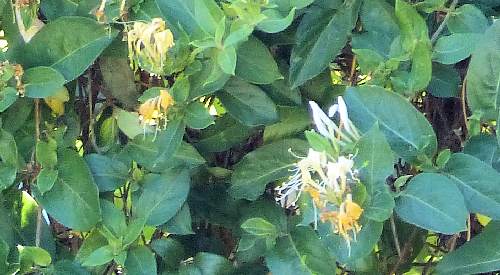Growing Lonicera japonica:
Japanese Honeysuckle
Description
Form: A rambling vine.
Lifespan: Perennial.
Leaf retention: Evergreen but cold deciduous.
Growth rate: Rapid.
Mature Size: 30' long as a climbing vine or 2' high as a ground cover.
Flowers: White, quickly aging to light yellow, fragrant, edible when not aged, bitter when aged.
Bloom: Spring into summer.
Fruit: Small, black berries containing several seeds, inedible.
Leaves: Oval, dark green, edible when boiled.
Stems: No thorns, branching. The vine roots wherever its stem nodes touch ground. It must be fastened on vertical surfaces because it has no tendrils or aerial rootlets.
Roots: This plant spreads by rhizomes and is highly invasive in moist ground.
Wildlife: It attracts butterflies, bees and, when trellised, hummingbirds. The berries attract birds. It is browsed by mammals.
Toxic / Danger: Parts of this plant are slightly poisonous, other parts, as noted above, are edible.
Origin: Asia.
Form: A rambling vine.
Lifespan: Perennial.
Leaf retention: Evergreen but cold deciduous.
Growth rate: Rapid.
Mature Size: 30' long as a climbing vine or 2' high as a ground cover.
Flowers: White, quickly aging to light yellow, fragrant, edible when not aged, bitter when aged.
Bloom: Spring into summer.
Fruit: Small, black berries containing several seeds, inedible.
Leaves: Oval, dark green, edible when boiled.
Stems: No thorns, branching. The vine roots wherever its stem nodes touch ground. It must be fastened on vertical surfaces because it has no tendrils or aerial rootlets.
Roots: This plant spreads by rhizomes and is highly invasive in moist ground.
Wildlife: It attracts butterflies, bees and, when trellised, hummingbirds. The berries attract birds. It is browsed by mammals.
Toxic / Danger: Parts of this plant are slightly poisonous, other parts, as noted above, are edible.
Origin: Asia.
Cultivation and Uses
USDA hardiness zones: 4-11.
Heat tolerant: Yes.
Drought tolerant: Yes.
Sun: Full sun to part shade.
Water once established: Deep soak once or twice a month, but more often when it is in full sun in the hottest parts of the year.
Soil: Tolerant, pH 6.1-7.8 (slightly acidic to slightly alkaline).
Mulch: Necessary to prevent shallow roots from heat damage.
Planting: It can be grown in a large container to prevent invasiveness.
Prune: Trim back 30% between fall and mid-winter to contain its size and remove dead vine build-up which can be a fire hazard. Cut it nearly to the ground to start over.
Litter: Moderate.
Propagation: Seed, cuttings or layering.
Uses: Ornamental, trellised screening, erosion control on banks and slopes in desert regions.
USDA hardiness zones: 4-11.
Heat tolerant: Yes.
Drought tolerant: Yes.
Sun: Full sun to part shade.
Water once established: Deep soak once or twice a month, but more often when it is in full sun in the hottest parts of the year.
Soil: Tolerant, pH 6.1-7.8 (slightly acidic to slightly alkaline).
Mulch: Necessary to prevent shallow roots from heat damage.
Planting: It can be grown in a large container to prevent invasiveness.
Prune: Trim back 30% between fall and mid-winter to contain its size and remove dead vine build-up which can be a fire hazard. Cut it nearly to the ground to start over.
Litter: Moderate.
Propagation: Seed, cuttings or layering.
Uses: Ornamental, trellised screening, erosion control on banks and slopes in desert regions.
Comments
This plant is a member of the Honeysuckle family (Caprifoliaceae). It is often sold in nurseries as Lonicera japonica 'Halliana'.
Do you have additional information or a different experience for these plants that you would like to share? Email info@GardenOracle.com. All contributions are welcome and appreciated.
This plant is a member of the Honeysuckle family (Caprifoliaceae). It is often sold in nurseries as Lonicera japonica 'Halliana'.
Do you have additional information or a different experience for these plants that you would like to share? Email info@GardenOracle.com. All contributions are welcome and appreciated.


Latest update: February, 2019
© 2008-2024 by GardenOracle.com

